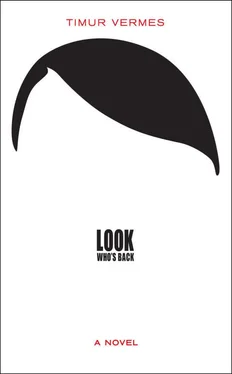Then, for good or evil, he must be snatched from the clutches of the past.
And although this was unquestionably a miracle of sorts, it was comparatively easier to achieve than the task of fashioning a sharp new sword from the inferior metal at hand. Just as this stream of insight began to calm my erratic thinking, a new concern swelled in my alert mind. For this conclusion brought with it another, like an uninvited guest: if Fate had been forced to play a cheap trick — there was no other way to describe it — the situation, however tranquil it may seem at first glance, must be even more cataclysmic than before.
And the Volk in even greater danger!
This was when I understood that now was not the moment to waste time on academic arguments, to agonise pedantically over the “how” and the “whether”, seeing as the “why” and the “that” were by far the more important considerations.
And yet there was still one question that remained unanswered: Why me? Given that so many heroes of German history were waiting for a second opportunity to lead the Volk to new glories.
Why not a Bismarck, or a Frederick the Great?
A Charlemagne?
An Otto?
After brief deliberation the answer came so easily that I almost chuckled at how flattered I felt. For the Herculean task that was waiting to be undertaken here truly seemed as if it would put even the bravest men, the great and greatest Germans in their place. All on his own, without party apparatus or executive power, one man in particular was being entrusted with the job, the man who had already demonstrated that he was capable of cleaning out the Augean stables of democracy. But did I want to put myself through all those painful sacrifices a second time? Swallow all the privations and derision again, nay, gulp them down with disdain? Spend my nights in an armchair beside a water urn in which sausages are heated up during the day for human consumption? And all this for the love of a people which, in the struggle for its destiny, had already left its Führer in the lurch once before? Whatever happened to the Steiner offensive? Or Paulus, that ignominious blackguard?
At this point I needed to keep my rancour in check, to separate reasonable anger from blind rage. Just as the Volk must stand by its Führer, so the Führer must stand by his Volk. Under the right leadership the simple soldier has always done his best — how can he be upbraided if he is unable to march loyally into enemy fire because cowardly, neglectful generals surrender his opportunity to die an honourable soldier’s death?
“Yes!” I cried, into the darkness of the kiosk. “Yes, I want to! And I will! Yes, yes, and three times, yes!”
The night answered with black silence. Then, close by, a lonesome voice hollered, “Exactly! They’re all a bunch of arseholes!”
I should have taken this as a warning. But if, back then, I had known of the ceaseless efforts, the bitter sacrifices that I would ultimately have to make, the sheer torment of the unequal struggle — I would have merely sworn my oath more heartily, at twice the volume.
The first steps were hard work. There was no question of any physical weakness on my part; the fact was, I felt like an imbecile in the newspaper vendor’s borrowed clothes. Trousers and shirt were just about passable. He had brought me a clean pair of blue cotton trousers, which he called “genes”, and a clean, red-checked cotton shirt. I had rather been expecting a suit and hat, but when I took a closer look at the newspaper seller I had to admit that my reasoning had been deluded. This man did not wear a suit in his kiosk and, from what I had observed so far, there was little of the bourgeois about the dress of his clientele, either. Hats, just to complete the picture, seemed to be uncommon. With the modest means at my disposal, I decided to lend as much dignity as I could to the ensemble by eschewing his bizarre habit of wearing the shirt loose outside the trousers, instead pushing it as far down my waistband as possible. The trousers were slightly too big for me, but with my belt I was able to fasten and hitch them up tightly. Then I fixed my strap over the right shoulder. It was no German soldier’s uniform, but the overall look was at least one of a man who knows how to dress decently. The shoes, on the other hand, were a problem.
Having assured me that he knew nobody else who took my size, the newspaper vendor had brought along an outlandish pair belonging to his adolescent son. Whether they could rightly be called shoes was a matter open to debate. They were huge, white, with massive soles: I felt like a circus clown. I had to resist the impulse of throwing them straight back into the face of that halfwit.
“I’m not wearing these,” I said. “Why, they make me look like a buffoon!”
No doubt insulted, he made a remark to the effect that he disapproved of the way I wore the trousers, but I ignored this. I wrapped the legs of the genes tightly around my calves and pushed them into my boots.
“You really don’t want to look like other people, do you?” the newspaper vendor said.
“Where do you think it would have got me if I had always done everything like so-called ‘other people’?” I retorted. “And where would Germany be?”
“Hmm,” he said, silenced by my comment. He lit another cigarette and said, “You could see it that way, I suppose.”
He folded up my uniform and put it in an interesting-looking bag. What struck me was not just the material, synthetic and very thin, clearly much more durable and flexible than paper. I was also intrigued by the words that were printed on it: “Media Market”. The bag must have served as packaging for that cretinous newspaper that I had spotted under the park bench. This proved that, deep down, the newspaper seller was a sensible man — he had kept the serviceable bag, but thrown away its infantile contents. Handing it to me, he explained the way to the cleaner’s and said perkily, “Hasta la vista, baby!” This modern German would take some time to accustom myself to.
I set off, albeit not directly to the cleaner’s. First I went back to the patch of ground where I had woken up. In spite of my fortitude, I could not deny I harboured a faint hope that someone from my past had accompanied me into the present day. I found the park bench where I had taken my first rest, then crossed the street — very carefully this time — and made my way between the houses to the waste ground. It was late morning and all was quiet. The Hitler Youths were not playing; they were probably at school. The place was empty. Bag in hand, I gingerly approached the puddle beside which I had awoken. It had practically dried up. Everything was so quiet, or at least as quiet as it can be in a big city. There was the muted drone of automobiles in the distance, and I could also hear the buzzing of a bumblebee.
“Psst,” I said. “Psst!”
Nothing happened.
“Bormann,” I called out softly. “Bormann! Are you there?”
A gust of wind whooshed across the terrain, an empty can knocked against another. Otherwise nothing stirred.
“Keitel?” I said. “Goebbels?”
But there was no answer. Fine. In fact, it was better this way. The strong man is mightiest alone, an axiom as true now as it ever was. Indeed it was truer than ever; I had greater clarity now, after all. It was my task and mine alone to save the Volk. Mine alone to save the earth and humankind. And the first step along this path led to the cleaner’s.
Full of resolve and bag in hand, I returned to my roots, to the place where I had learned the most valuable lessons of my life: the street. I carefully followed the directions I had been given, comparing terraces of houses and streets, checking, considering, cogitating, chancing. My preliminary survey was rather positive: the country, or the city at least, seemed free of rubble and in good order; overall one might certify it satisfactorily pre-war. The new Volkswagens seemed to be performing reliably; they were quieter these days, albeit an acquired taste aesthetically. What stood out to my keen eye were the mystifying slogans covering every wall. Yes, I was familiar with this technique; in Weimar, especially, the communist accomplices used to daub their Bolshevist claptrap all over the place. And I myself had learned from this. But at least back then you could read the words painted by either side. Now, I noted, a large number of the messages — their authors evidently regarded them as sufficiently important to deface the houses of honest citizens with them — were simply impossible to decipher. I could only hope that this was the brainchild of illiterate leftwing vermin, but as I kept going I observed that the legibility of the slogans did not change from house to house, and therefore had to assume that important messages such as “Germany, awake” or “Sieg Heil” were possibly hiding amongst them too. Confronted with such ubiquitous dilettantism, I felt my blood boil. It was plain for all to see that what was missing here was firm leadership, tight organisation. What made this particularly irksome was the fact that many of these writings had been produced with substantial colour and apparent effort. Or had the world in my absence developed a specific style of writing for political slogans? Determined to get to the bottom of the matter, I approached a lady who was holding a child by the hand.
Читать дальше












